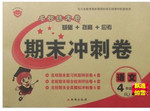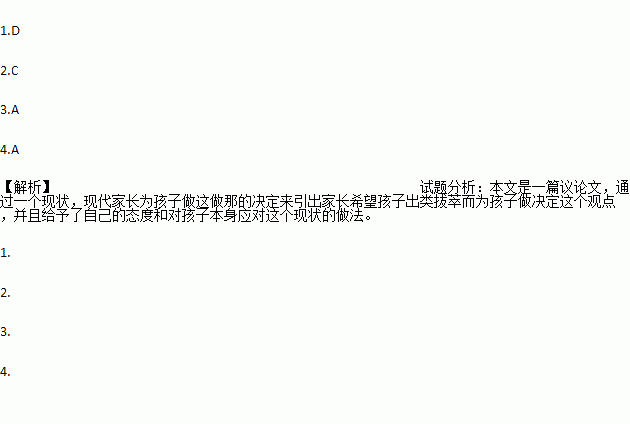题目内容
At heart, parents always wish the best for their children, and they work hard for that. Nowadays, we see parents deciding the schools for their little ones before the baby is even born. Once kids start going to school, some parents want to have a time-to-time update of their kid's activities. They want to come to the classroom every day, keep an eye on whom they talk to, know the friends they keep, start telling them how to do their job, and keep talking or giving a feedback(反馈) to them about everything under the sun. Besides, they send their kids for extra hobby classes, as they want their children to do best in every field.
When it comes to the education, super mom and dad have all the plans made for their children, and I am sure that they have come up with the best. So, try to fight for the dreams that your parents have set for you. However, in some cases, it may happen that the kids have some different dreams. Parents sometimes don't even consider the choice of their kids and may force them to do what they wanted to do in life. It's good to plan the future for the children, but leave at least some decisions to them.
So what should the children do? First, hear out all the plans that your parents have made for you. If you have some different ideas, then sit down and talk to your family about it. Be patient and respect their decisions, but put your plan forth, and make them understand what you want to do and why. Many times, you are not aware of the difficulties that you may have to face while pursuing your dreams. Ask your parents for suggestions, which will make them feel good and involved. That way, they may support you if you are going on the right path.
1.The parents described in Paragraph 1 tend to .
A. have a good understanding of their children
B. worry a lot about their children
C. take good care of their children
D. expect too much from their children
2.With respect to educational plans, the author advises .
A. children to do as they are told
B. children to turn a deaf ear to their parents
C. parents to respect their children’s choices
D. parents to do everything for their children
3.The underlined word “pursuing” in Paragraph 3 is closest in meaning to “ ”.
A. going after B. planning for
C. adapting to D. preparing for
4.What is the author’s attitude towards these super parents’ behaviors?
A. Opposed B. Doubtful
C. Uncaring D. Supportive
 名校练考卷期末冲刺卷系列答案
名校练考卷期末冲刺卷系列答案
